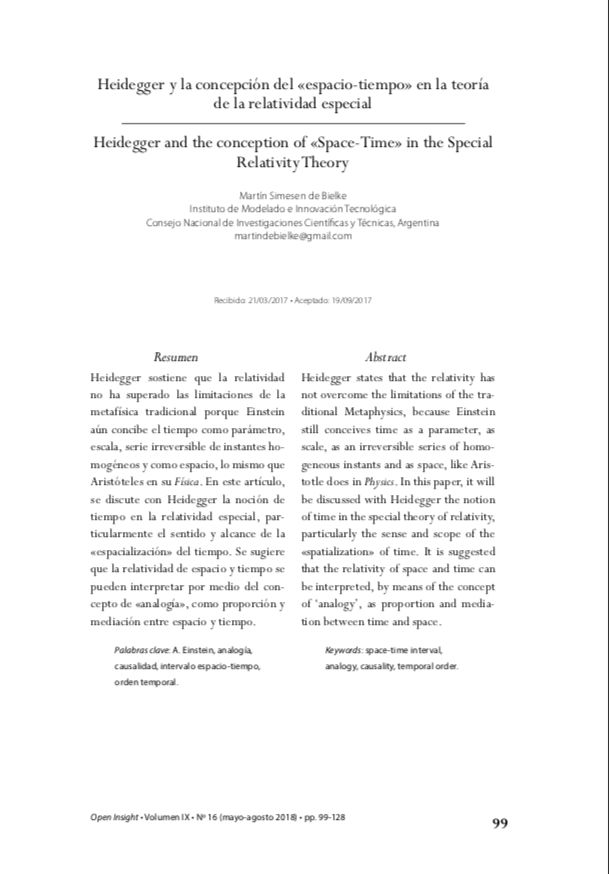Heidegger and the conception of «Space-Time» in the Special Relativity Theory
Abstract
Heidegger states that the relativity has not overcome the limitations of the tra- ditional Metaphysics, because Einstein still conceives time as a parameter, as scale, as an irreversible series of homo- geneous instants and as space, like Aris- totle does in Physics. In this paper, it will be discussed with Heidegger the notion of time in the special theory of relativity, particularly the sense and scope of the «spatialization» of time. It is suggested that the relativity of space and time can be interpreted, by means of the concept of ‘analogy’, as proportion and media- tion between time and space.References
Heidegger, M. (2009a). El concepto de tiempo en la ciencia histórica.Tiempo e historia. J.A. Escudero, trad. Madrid: Trotta.
Heidegger, M. (2009b). El trabajo de investigación de Wilhelm Dilthey y la actual lucha por una concepción histórica del mundo.Tiempo e historia. J.A. Escudero, trad. Madrid: Trotta.
Heidegger, M. (2013). Seminarios de Zollikon. A. Xolocotzi Yañez, trad. México: Her- der.
Howard, D., “Was Einstein really a realist?” Perspectives on science: historical, philosophical, social, vol. 1, 1993, p. 204–251.
Laue von-, M., “Zwei Einwände gegen die Relativitätstheorie und ihre Widerlegung”, Physikalische Zeitschrift, vol. 13, 1912, p118-120. https://archive.org/details/ZweiEinwaendeGegenDieRelativitaetstheorieUndIhreWiderlegung. Consul- tado el 15 de Marzo de 2017.
Minkowski, H. (1908). “Raum und Zeit”. En Jahresbericht der deutschen Mathe- matiker-Vereinigung, 18, p75-88. Disponible en: http://www.math.nyu. edu/~tschinke/papers/yuri/14minkowski/raum-und-zeit.pdf. [Última con- sulta: 30/09/2017].
Platón. (2007). Diálogos VI: Filebo, Timeo, Critias, Cartas. Madrid: Gredos.
Reichenbach, H. (1920). Relativitätstheorie und Erkenntnis a priori Berlin: Springer.
Reichenbach, H. (1924). “Axiomatik der relativistischen Raum-Zeit-Lehre”. Die Wis- senschaft, 72.
Reichenbach, H. (1928). Philosophie der Raum-Zeit-Lehre. Berlin: Springer.
Reichenbach, H. (1957). The Philosophy of Space & Time. Nueva York: Dover.
Reichenbach, H. (1965). The theory of relativity and a priori knowledge. Berkeley; Los Angeles: University of California Press.
Reichenbach, H. (1969). “Axiomatik der relativistischen Raum-Zeit-Lehre”. Die Wis- senschaft, 72. Axiomatization of the theory of relativity. Berkeley; Los Angeles: Uni- versity of California Press.
Reichenbach, H. (1979). Die philosophische Bedeutung der Relativitätstheorie. Bruns- chweig: Vieweg.
Sánchez Ron, J.M. (1983). El origen y desarrollo de la relatividad. Madrid: Alianza.
Schlick, M. (1917). Raum und Zeit in den gegenwärtigen Physik. Zur Einführung in das Verständnis der allgemeinen Relativitätstheorie. Berlin: Springer.
Schlick, M. (1920). Space and Time in Contemporary Physics: An Introduction to the Theory of Relativity and Gravitation. Londres y Nueva York: Oxford University Press.
Sklar, L. (1977). Space, Time and Spacetime. Berkeley: University of California Press.
Sklar, L., (1985). Philosophy and Spacetime Physics. Berkeley: University of California Press.
Smart, J.C. (1964). Problems of space and time. New York: Macmillan Publishing Com- pany, 1964.
Taylor, E.F.; J.A.Weehler. (2000). Exploring Black Holes: An Introduction to General Relatitvity, New York: Prentice Hall.
Tippler, P.; R. Llewellyn. (2008). Modern Physics New York: H. W Freeman and Com- pany.
Vigo, A. (2006). Estudios aristotélicos Navarra: Eunsa.





